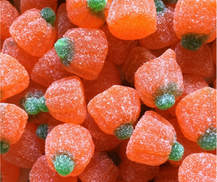
You may be surprised to learn that as a Naturopath I am not opposed to Halloween. I think it's fantastic that some people have taken a stance against the traditional celebration, and I applaud those who replace candy with healthier options. However, I would like to highlight some of the advantages of not micro-managing the holiday for your kids. The reason I've chosen to share this with you today is because of the comments from my 9 and 5 year old sons, Halloween veterans at this point.
The fact is, it is basically impossible to avoid being around fast food, candy, sugary drinks, and all forms of food products on a daily basis. Even with the noble efforts that have limited exposure to junk food in schools, all you have to do is drive down any main street, visit any grocery store, or watch TV for 5 minutes. I'm not sharing anything new here, we all know and most of us struggle with making healthy choices when other tasty options are readily available or we're pushed for time. My point is, however, it is important to teach our children how to navigate the world of food choices and arm them with nutritional knowledge to make good decisions for their growth and their health. Halloween provides us with an exaggerated learning opportunity for our kids; given full access to chocolate, candy, and chips, what will they do?
I would like to share with you the original, unprompted comments from my sons over the last couple of days, not to brag but to illustrate how Halloween can test your kids' nutrition knowledge and help guide you on what to teach them next.
"I will only have have three things each day" - Quentin
Portion Control
Our eating patterns begin at a young age. I see many adults who struggle with eating appropriate quantities of each food. Learning at an early age that it's ok to save some for later puts the pressure off of eating large amounts at a time. It also encourages them to look inward and ask the question "Am I still hungry, or am I just eating because it tastes good?" It doesn't really matter what the answer to that question might be, it's recognizing the difference and how to separate the feeling of hunger from desire. Sugar tastes good, and it's ok to appreciate some sweetness.
"I don't like taking candy to school because it changes how I think and makes me feel tired" - Jackson
Mind-Body Connection
I cannot tell you how many adults have difficulty recognizing how different foods make them feel. Children, on the other hand, have a much easier time of realizing that dairy might upset their bellies, sugar makes them feel jittery, or eggs make their skin itchy. We just need to help them make these connections between their food and how they feel. To do this, I will often point out my own observations, which has led my children to do similar reflecting. For example, I have told Jackson that I think the reason he had trouble settling down for bedtime one night is because he has eaten something sugary within the past two hours. Connecting how we feel with how we eat, sets the stage for making choices so we can do better next time.
"If I eat protein can I have a Halloween treat?" - Quentin
Nutrition and Blood Sugar
Lately I've been focusing on teaching my kids which nutrients come from certain foods. For my 5 year old, it's the basics of protein, fruits and vegetables, and starch. From these table side chats, he's learned that it's good to have protein before having sugar. The reason for this combination is that consuming protein helps to slow down the absorption of sugar and thus prevents the spikes and crashes in energy that come from eating sugar alone.
"Is this gluten free?" - Jackson
Don't Be Afraid to Ask For What You Need
No longer is there a huge stigma around food allergies and sensitivities. As on original peanut allergy victim, I am thrilled to see that children are much more protected from dangerous food experiences. Food labeling and limits at school are a part of this, but my favourite part about Jackson's question is that he has learned to advocate for his own needs. Many adults struggle with standing up for their health for fear of offending their host, or inconveniencing the chef; they would rather spend the rest of the night in the bathroom than ask for a menu modification or bring their own food to an event. It is important to look after your own needs, and it's ok to stand up for yourself - life lessons that are valuable in so many ways.
As you can see, conversations about food are an important part of our children's upbringing. I hope that you will take inspiration from the things I've shared with you today. Feel free to share with me your own family habits and teachings, I learn just as much from all of you.
We're in this together,
Dr. Christa
 RSS Feed
RSS Feed